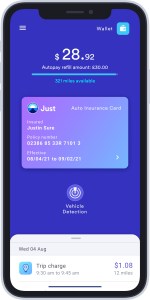Just Insure, a pay-per-mile insurance technology company, has raised $8 million in a funding round.
CrossCut Ventures, ManchesterStory and Western Technology Investments co-led the investment, which brings its total raised to $15.3 million since its January 2019 inception.
Los Angeles-based Just says it uses telematics “to reward safe drivers and reduce insurer bias” by looking at factors such as how, when and where customers drive, rather than factors such as ZIP code or marital status as most traditional insurers do. Or put more simply, it charges customers only for miles driven and its rates vary based on driving behavior. This way, Just says it’s able to offer lower rates for “safer drivers,” and it claims to save its customers around 40% from their “previous auto insurance company.” For now, it’s only available in Arizona, although the company plans to expand to other markets such as Texas, Nevada, Pennsylvania, Ohio and Georgia.

Of course, Just is not the first company to offer personalized auto insurance. There’s Metromile, which launched its personalized pay-per-mile auto insurance in 2012. And there’s also Root Insurance, an Ohio-based car insurance startup that uses smartphone technology to understand individual driver behavior. Although there are similarities between Root and Just, there are also distinct differences, according to founder and CEO Robert Smithson.
Root charges customers a monthly fee, and when policies are renewed, the rate is subject to change based on driving behavior. Just has a similar model. If its drivers exhibits safe driving behavior, their rates can fall. On the other hand, if they exhibit dangerous behavior, their rates can rise. But unlike Root, Smithson said, Just only charges its “liability only” customers for miles driven. There is no monthly fee. For “full cover” customers, Just also includes a “small daily charge” to reflect the risk that someone could steal their car. For its part, MetroMile charges customers a base rate plus a per mile rate. Neither rate are affected by how a person drives, notes Smithson.
“The [Just] per mile price that a customer gets can change every month. This means we’re able to rapidly reward safe drivers with lower rates, and to increase them for those who drive less well,” Smithson said. “This rapid feedback loop encourages people to make smarter driving decisions. And it means that our customers have fewer accidents, and we do better. ”
In 2020, Root had a direct loss ratio of 82%. Just’s direct loss ratio is 65.8% year to date so far. But of course, it has far fewer customers and is only serving one market. Still, the company says that it has already achieved underwriting profitability in terms of what portion of premium to it pays out in claims.
Also, with so many people shifting to working from home over the last year, Just says it has seen increased demand this year. It issued over 1,000 new policies in the second quarter, up “tenfold” compared to the same period in 2020. The startup said during that same time, its revenue climbed 1,400% compared to the second quarter of 2020.
“People are simply driving less as a result of increased work-from-home rates, and this isn’t changing anytime soon,” Smithson said. “Our approach enables us to offer customers rates that are truly reflective of their driving.”
The company likens its user experience to that of a prepaid phone card. Just customers can “load up” their account for $30 for minimum liability-only coverage and $75 for full coverage to start driving. The company’s insurance policy is for 30 days. So as customers drive, their balance declines. Every 30 days, the company changes each customer’s price as it gathers more data about their driving habits.
As Metromile looks to go public, insurtech funding is on the rise
It’s an approach that Matt Kinley, co-founder and managing partner at ManchesterStory, had never before seen.
“It is more fair, affordable and customized across the board, and unique because the company offers customers rates that are actually reflective of their driving, which rewards safe drivers with lower insurance premiums,” he said.
The company plans to use its new capital in part to do some hiring — it currently has a staff of 35 — and scale its product offering. It is also planning to launch beyond Arizona into neighboring states. In particular, Smithson said the startup is “keen” to launch in Texas.































Comment